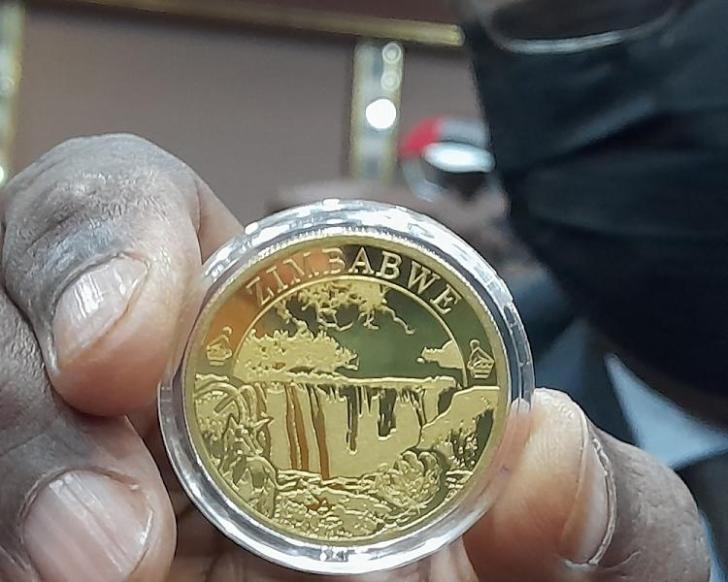News / Local
RBZ's decision to halt gold coin sales has drawn warnings
30 Jun 2025 at 08:15hrs |
6 Views

The Reserve Bank of Zimbabwe (RBZ)'s decision to suspend the sale of gold coins has drawn warnings from an economic analyst, who says the move could expose the Zimbabwe Gold (ZWG) currency to inflationary pressures and destabilise financial markets.
RBZ Governor Dr John Mushayavanhu announced the suspension last week, clarifying that the halt marked the completion of a mop-up exercise involving remaining gold coin stock - including previously redeemed coins - and not the reintroduction of new coins, which were discontinued in April 2024.
"The RBZ would like to clarify that this was a sale meant to clear remaining stock and not the minting of new gold coins. The latest round of gold coin sales also included coins redeemed by holders," said Mushayavanhu in a public statement.
He added that future sales would only resume once a sizable quantity of gold coins is returned to the market through redemptions, noting that coins currently in circulation remain tradable and redeemable.
The gold coins, first introduced in 2022, were designed as a store-of-value instrument to mop up excess liquidity in the economy and stabilize the local currency by absorbing demand for foreign exchange.
However, a senior economist who spoke on condition of anonymity cautioned that suspending the sales could have unintended consequences.
"These coins provided an effective buffer by attracting liquidity into a safe investment. Their removal risks pushing holders of excess ZWG into the parallel forex market in search of the US dollar, which could significantly weaken the local currency," the economist said.
He warned that with industry lobbying for looser liquidity to boost operations, the current tight monetary environment may not be sustainable - and the RBZ might struggle to maintain exchange rate stability without alternative measures in place.
"The gold coins helped control speculative behaviour in the foreign currency market. Without them, the RBZ has fewer tools to mop up excess liquidity, and this may result in inflationary risks if money supply begins to outpace productive activity," he added.
As of February 2023, the RBZ had sold gold coins worth ZW$20 billion, most of which were bought by corporates looking for a hedge against currency depreciation. According to the Insurance and Pensions Commission (IPEC), pension funds alone had invested ZW$2.29 billion in gold coins during that period.
With companies and investors increasingly turning to gold-backed instruments as a store of value, the latest move could lead to renewed volatility in the currency market if alternative instruments are not promptly introduced.
For now, the RBZ has insisted the gold coins already in the market remain valid for trade or redemption. But analysts say the suspension could test the resilience of Zimbabwe's newly introduced structured currency, particularly if demand for foreign exchange surges.
RBZ Governor Dr John Mushayavanhu announced the suspension last week, clarifying that the halt marked the completion of a mop-up exercise involving remaining gold coin stock - including previously redeemed coins - and not the reintroduction of new coins, which were discontinued in April 2024.
"The RBZ would like to clarify that this was a sale meant to clear remaining stock and not the minting of new gold coins. The latest round of gold coin sales also included coins redeemed by holders," said Mushayavanhu in a public statement.
He added that future sales would only resume once a sizable quantity of gold coins is returned to the market through redemptions, noting that coins currently in circulation remain tradable and redeemable.
The gold coins, first introduced in 2022, were designed as a store-of-value instrument to mop up excess liquidity in the economy and stabilize the local currency by absorbing demand for foreign exchange.
However, a senior economist who spoke on condition of anonymity cautioned that suspending the sales could have unintended consequences.
"These coins provided an effective buffer by attracting liquidity into a safe investment. Their removal risks pushing holders of excess ZWG into the parallel forex market in search of the US dollar, which could significantly weaken the local currency," the economist said.
He warned that with industry lobbying for looser liquidity to boost operations, the current tight monetary environment may not be sustainable - and the RBZ might struggle to maintain exchange rate stability without alternative measures in place.
"The gold coins helped control speculative behaviour in the foreign currency market. Without them, the RBZ has fewer tools to mop up excess liquidity, and this may result in inflationary risks if money supply begins to outpace productive activity," he added.
As of February 2023, the RBZ had sold gold coins worth ZW$20 billion, most of which were bought by corporates looking for a hedge against currency depreciation. According to the Insurance and Pensions Commission (IPEC), pension funds alone had invested ZW$2.29 billion in gold coins during that period.
With companies and investors increasingly turning to gold-backed instruments as a store of value, the latest move could lead to renewed volatility in the currency market if alternative instruments are not promptly introduced.
For now, the RBZ has insisted the gold coins already in the market remain valid for trade or redemption. But analysts say the suspension could test the resilience of Zimbabwe's newly introduced structured currency, particularly if demand for foreign exchange surges.
Source - NewZimbabwe
Join the discussion
Loading comments…































